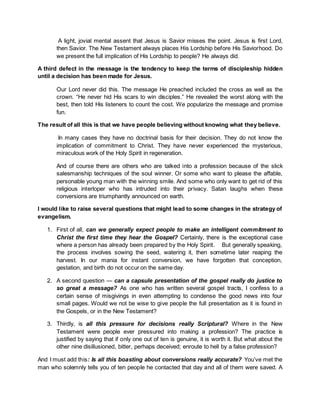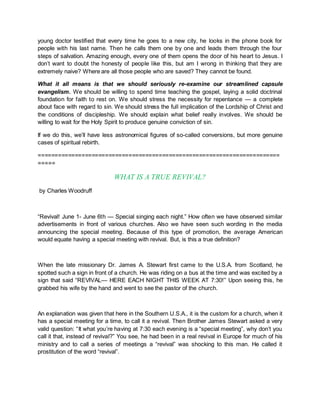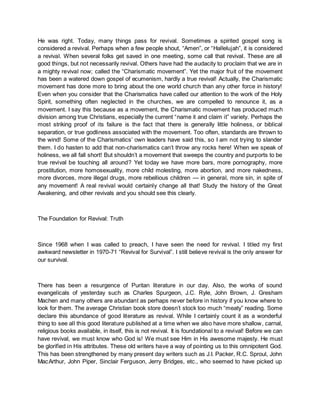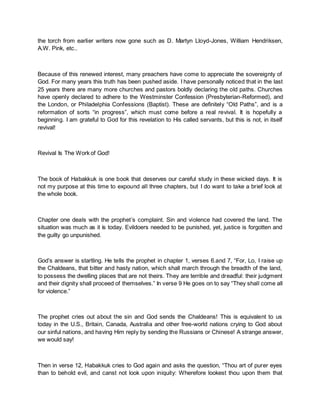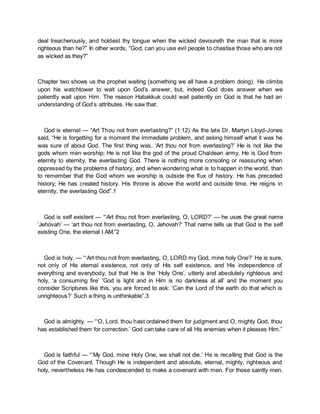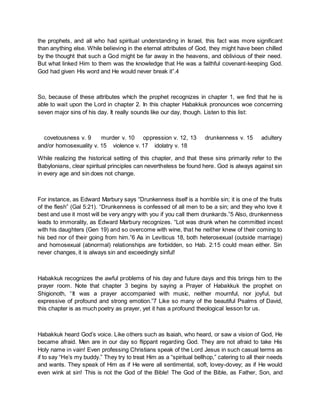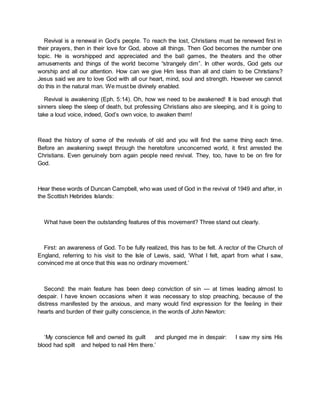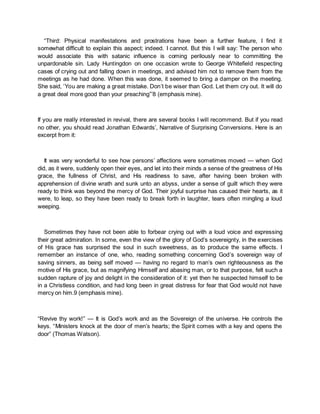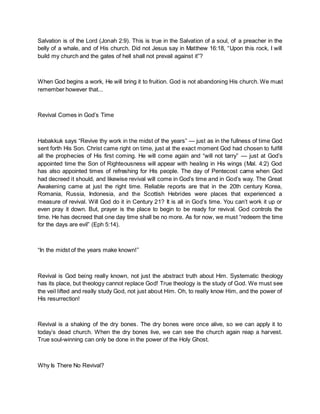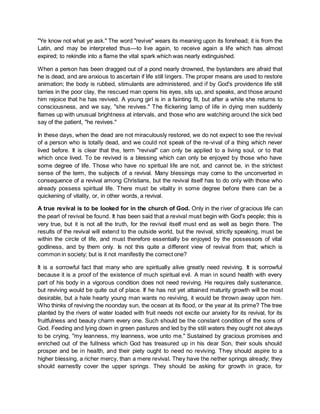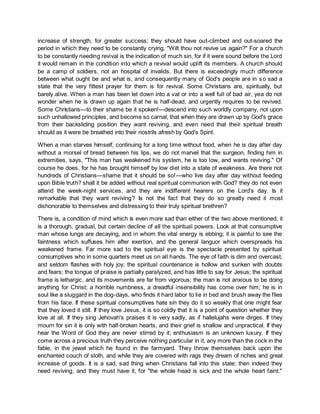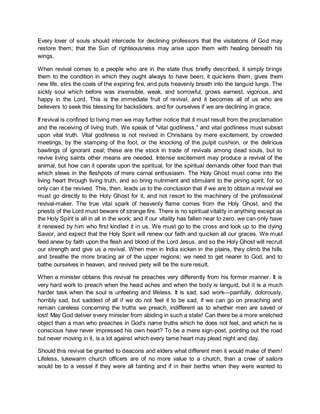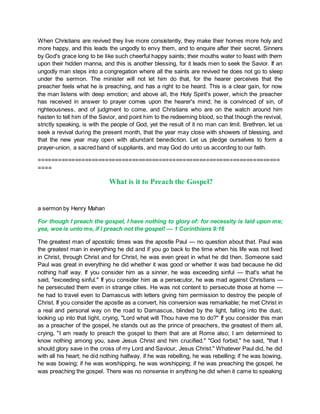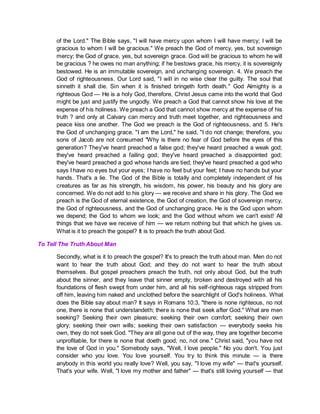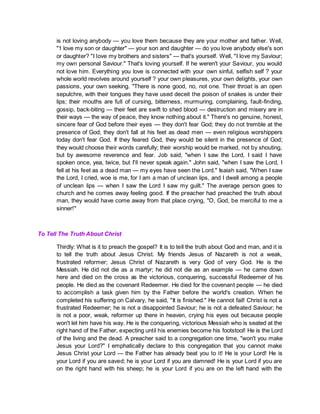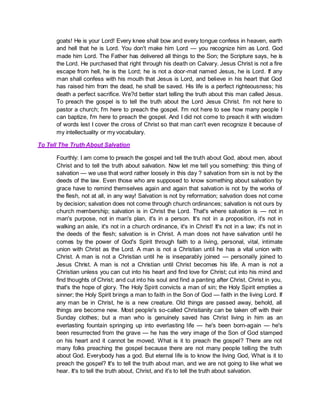Francis Schaeffer argues that evangelicals must take truth seriously and preach and practice biblical truth, even when it is costly. He makes three main points:
1. Evangelicals must accept and preach propositional biblical truth rather than viewing religious truth as only psychological. They must take a stand for truth and against what contradicts God's word.
2. Evangelicals must carefully consider the purity of the visible church and what church discipline and living according to doctrine means.
3. If evangelicals practice "latitudinarianism" or compromise central truths, they will lose credibility with a skeptical world that does not believe truth is possible. They must practice what they preach about truth.
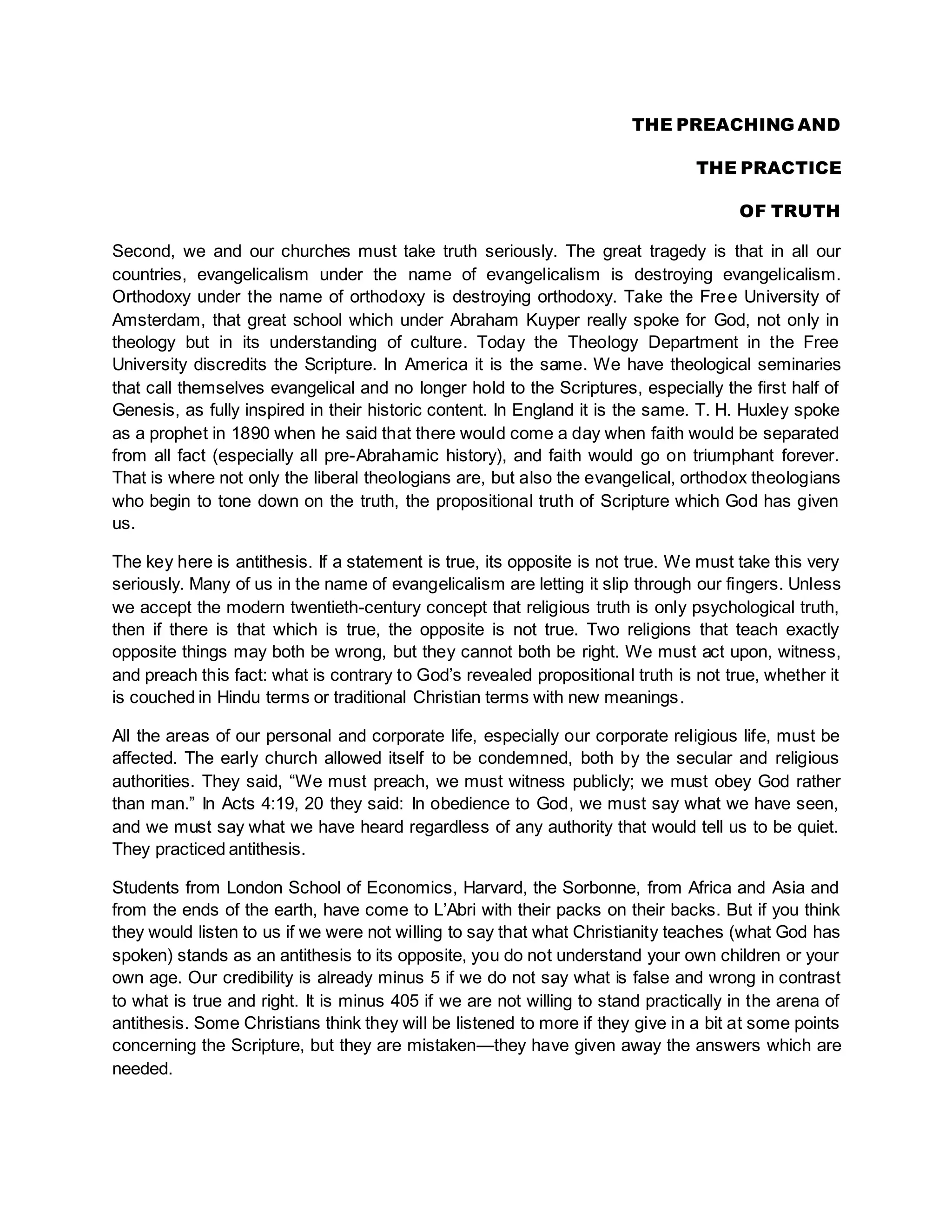
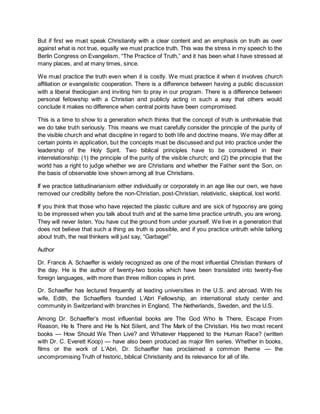
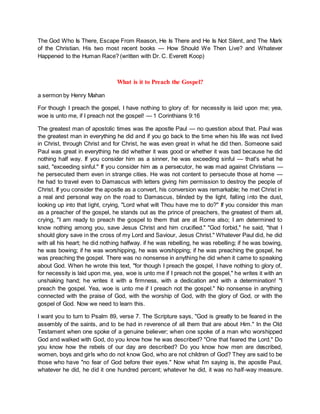
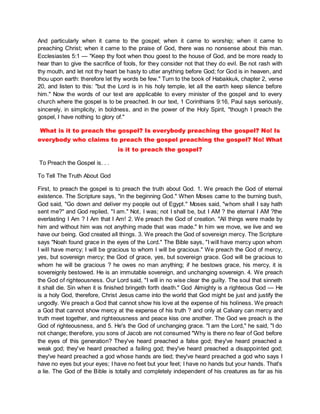

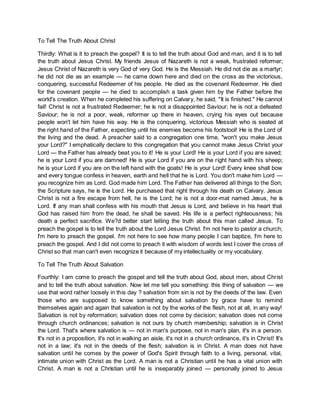
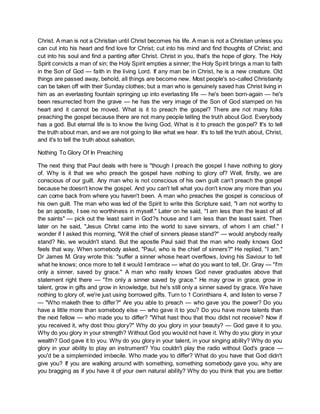
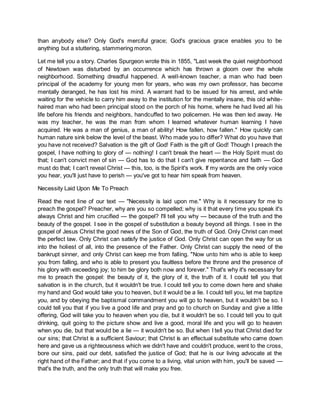

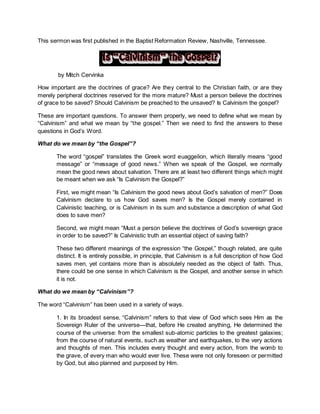
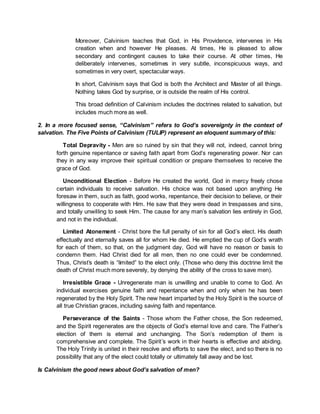
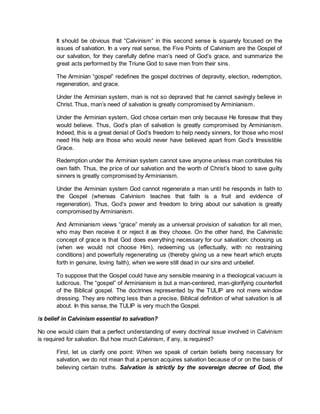
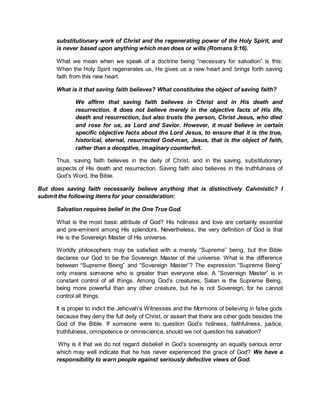
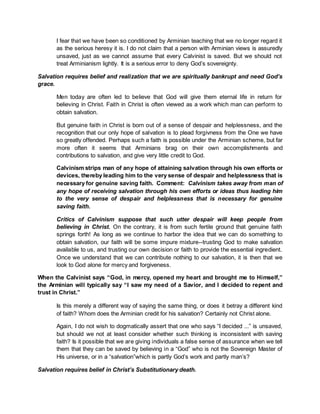
![Without question, one of the most essential elements of saving faith is trust in Christ’s
sacrificial death for guilty sinners. The doctrine of substitution is at the very heart of the
Gospel...
1 Corinthians 15:1-4 - “Moreover, brethren, I declare unto you the gospel which
I preached unto you, which also ye have received, and wherein ye stand; By
which also ye are saved, if ye keep in memory what I preached unto you, unless
ye have believed in vain. For I delivered unto you first of all that which I also
received, how that Christ died for our sins according to the scriptures; And that
he was buried, and that he rose again the third day according to the scriptures:”
2 Corinthians 5:21 - “For he hath made him [to be] sin for us, who knew no sin;
that we might be made the righteousness of God in him.”
The sacrifice of Christ is the very source and basis of our salvation. We are saved from
our sin because He bore the penalty for our sin. The wrath which God bore against us
has been swallowed up by the Cross of Christ. If Christ died for you, then God has no
wrath left to pour out upon you. Christ did not merely sip from the cup of God’s wrath—
He drank the cup dry!
When we say that Christ died for all men, we cheapen His sacrifice, for Scripture
plainly declares that all men will not be saved.
1. To say that Christ died for every man would mean that the death of Christ, in
itself, is insufficient to save anyone.
2. The Arminian “gospel” adds a qualification or condition to the work of Christ. It
says “It is not enough that Christ died for you—now you must do your part by
believing in Him.” Thus, we add man’s faith or decision to believe, as a second
requisite to salvation. This divides the glory for man’s salvation between Christ
who died for us, and the faith-giver (whether it be man himself, or the Holy Spirit),
and it thereby belittles Christ and His sacrificial death.
The object of faith is no longer Christ’s death alone, but is partly the death of
Christ, and partly the act of faith.
We must raise the troubling question: “If your faith does not reside wholly in
Christ’s sacrifice, is it saving faith?”
Many deceive themselves into thinking that they believe in the Cross alone for salvation,
when their theology betrays their true convictions by insisting that the Cross cannot save
anyone unless man does his part by believing.
What can we conclude?
God is the final judge of men’s hearts. He has the sovereign power to quicken
people in response to the preaching of Christ. He is full of mercy, and may
indeed bring forth genuine faith in response to a seriously flawed presentation of](https://image.slidesharecdn.com/evangelismsalvationcorrectlydone-150211080557-conversion-gate01/85/Evangelism-salvation-correctly-done-15-320.jpg)
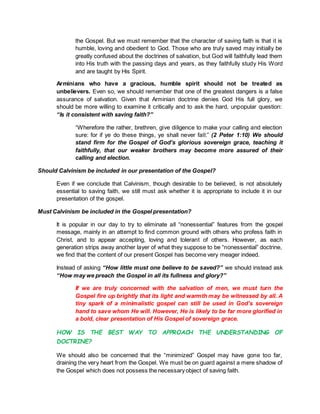
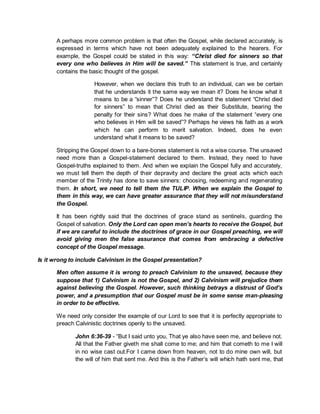
![of all which he hath given me I should lose nothing, but should raise it up again at
the last day.”
John 6:43-45 - “Jesus therefore answered and said unto them, Murmur not
among yourselves. No man can come to me, except the Father which hath sent
me draw him: and I will raise him up at the last day. It is written in the prophets,
And they shall be all taught of God. Every man therefore that hath heard, and
hath learned of the Father, cometh unto me.”
John 6:64-66 - “But there are some of you that believe not. For Jesus knew from
the beginning who they were that believed not, and who should betray him. And
he said, Therefore said I unto you, that no man can come unto me, except it were
given unto him of my Father. From that [time] many of his disciples went back,
and walked no more with him.”
Jesus openly taught the multitudes that there were certain ones whom the Father gave
to Him, and they are the ones who would come to Him and be saved. He taught that no
one could come to Him unless he was drawn (literally “dragged”) by the Father. He
taught that God would teach certain ones, and that everyone so taught would come to
Him. Here our Lord clearly taught the doctrines of Sovereign Election, Total
Depravityand Irresistible Grace to a crowd which contained many unbelievers.
And significantly, when He repeated (in verse 65) that no one could come to Him unless
it had been granted by the Father, many of His disciples “went back and walked no more
with Him .” Why did they forsake our Lord? John says it was “From that time”—i.e. this
statement that no one could come to Him unless the Father granted it to them.
In other words, they forsook Christ over the doctrines of Total Depravity and
Irresistible Grace.
Suppose a “disciple” today gets upset over these doctrines and leaves the church. Is he
saved? What if he had been living in our Lord’s day and had heard these doctrines
preached by Christ? Would he have forsaken our Lord when He preached them? This
should give us cause for great concern over those who will not tolerate the doctrines of
grace.
Just as importantly, it shows that we should not hold back teaching the TULIP just
because we fear someone may get angry and leave. Our responsibility is to faithfully
proclaim God’s glorious Word, and to leave the results to Him. We have no reason to
suppose that we are exempted from openly teaching the doctrines of grace, when our
Lord gave us such a clear model to follow.
1. John 6 is not the only such example.
2. John 10:11 - “I am the good shepherd: the good shepherd giveth his life for the
sheep.”](https://image.slidesharecdn.com/evangelismsalvationcorrectlydone-150211080557-conversion-gate01/85/Evangelism-salvation-correctly-done-18-320.jpg)
![3. John 10:26 - “But ye believe not, because ye are not of my sheep, as I said unto
you.”
Notice that our Lord plainly taught Limited Atonement when He said “the good shepherd
giveth His life for the sheep.” Notice also that He openly told some of His hearers that
they were not His sheep (and thus that He did not die for them!)
Finally, notice the relationship between believing and being a sheep. The reason they
did not believe was that they were not sheep! Arminian doctrine would like to turn the
passage around. But our Lord’s statement clearly teaches Irresistible Grace.
Peter on Pentecost openly taught God’s sovereignty to the unsaved when He
said: Acts 2:23 - “Him, being delivered by the determinate counsel and
foreknowledge of God, ye have taken, and by wicked hands have crucified and
slain:”
When Judas betrayed Christ, it was by God’s “predetermined plan and
foreknowledge.” Peter openly declared this truth to the unsaved multitude on
Pentecost, and it did not seem to hinder the visible success of his preaching, but
instead led to a revival of 3000 souls led to the Lord.
Rather than preventing men from trusting in Christ, proclaiming God’s sovereign glory
can be greatly used of God to bring about great revival.
Arminianism depicts God as a weak, frustrated deity who cannot accomplish His will:
He wants all men to be saved, and has done all that He can to bring it to pass, but still a
vast multitude reject Christ to their own ruin.
Calvinism, on the other hand, proclaims God as the Sovereign Lord of the universe
who has from eternity planned and purposed all that will ever come to pass. God will
save each and every one He has purposed to save, and this will exalt His marvelous
mercy and grace. God has appointed the rest to follow their own sinful impulses down
the wide path that leads to destruction, and this will exalt His awesome holiness and
justice. When we proclaim such a God as this, we should be prepared for great things.
Paul’s epistle to the Romans was written to a church which he had never, as yet,
visited. The epistle was addressed to To all that be in Rome, beloved of God,
called [to be] saints: This means that the epistle was to be read to (or by) every
saint in the church, no matter how new to the faith.
Romans is universally regarded as one of the most evangelical of the books of
the Bible. In this epistle, Paul proclaims much that we normally think of as Gospel
material: man’s sin and depravity, justification by faith alone, and even the
spiritual conflict of the Christian life. But in chapters 8, 9 and 11, he makes some
very strong statements about God’s sovereignty in salvation...](https://image.slidesharecdn.com/evangelismsalvationcorrectlydone-150211080557-conversion-gate01/85/Evangelism-salvation-correctly-done-19-320.jpg)
![Romans 8:29 - “For whom he did foreknow, he also did predestinate [to
be] conformed to the image of his Son, that he might be the firstborn
among many brethren.Moreover whom he did predestinate, them he also
called: and whom he called, them he also justified: and whom he justified,
them he also glorified. What shall we then say to these things? If God [be]
for us, who [can be] against us? He that spared not his own Son, but
delivered him up for us all, how shall he not with him also freely give us all
things? Who shall lay any thing to the charge of God’s elect? [It is] God
that justifieth.”
Romans 9:8-23 - “That is, They which are the children of the flesh, these
[are] not the children of God: but the children of the promise are counted
for the seed. For this [is] the word of promise, At this time will I come, and
Sara shall have a son. And not only [this]; but when Rebecca also had
conceived by one, [even] by our father Isaac; (For [the children] being not
yet born, neither having done any good or evil, that the purpose of God
according to election might stand, not of works, but of him that calleth;) It
was said unto her, The elder shall serve the younger. As it is written,
Jacob have I loved, but Esau have I hated. What shall we say then? [Is
there] unrighteousness with God? God forbid. For he saith to Moses, I will
have mercy on whom I will have mercy, and I will have compassion on
whom I will have compassion. So then [it is] not of him that willeth, nor of
him that runneth, but of God that sheweth mercy. For the scripture saith
unto Pharaoh, Even for this same purpose have I raised thee up, that I
might shew my power in thee, and that my name might be declared
throughout all the earth. Therefore hath he mercy on whom he will [have
mercy], and whom he will he hardeneth. Thou wilt say then unto me, Why
doth he yet find fault? For who hath resisted his will? Nay but, O man,
who art thou that repliest against God? Shall the thing formed say to him
that formed [it], Why hast thou made me thus? Hath not the potter power
over the clay, of the same lump to make one vessel unto honour, and
another unto dishonour? [What] if God, willing to shew [his] wrath, and to
make his power known, endured with much longsuffering the vessels of
wrath fitted to destruction: And that he might make known the riches of
his glory on the vessels of mercy, which he had afore prepared unto
glory,...”
Imagine the impact this must have had upon new converts in the Roman church! Yet,
Paul did not pull any punches. He was not fearful that openly preaching God’s
sovereignty would cause people to turn away from Christ, for he was fully confident that
every truly elect person would persevere by God’s sovereign power. Indeed, he no doubt
felt that to omit proclaiming God’s sovereignty would have betrayed the trust which God
had given him. To preach the Gospel rightly, we declare the awesome glories of God—
especially His sovereignty.](https://image.slidesharecdn.com/evangelismsalvationcorrectlydone-150211080557-conversion-gate01/85/Evangelism-salvation-correctly-done-20-320.jpg)
![We should remember Paul’s declaration to the Ephesian elders: Acts 20:27 - “For I have
not shunned to declare unto you all the counsel of God.”
It appears that he did not shun to declare “the whole purpose of God” to the Roman
saints, either. The entire spectrum of doctrine, from the basic issues of sin and
justification, to the doctrine of God’s sovereign choice of some and hardening of others,
is boldly declared in the epistle to the Romans. May God grant us such boldness!
Romans 11:4-10 - “But what saith the answer of God unto him? I have reserved to
myself seven thousand men, who have not bowed the knee to [the image of] Baal. Even
so then at this present time also there is a remnant according to the election of grace.
And if by grace, then [is it] no more of works: otherwise grace is no more grace. But if [it
be] of works, then is it no more grace: otherwise work is no more work. What then?
Israel hath not obtained that which he seeketh for; but the election hath obtained it, and
the rest were blinded (According as it is written, God hath given them the spirit of
slumber, eyes that they should not see, and ears that they should not hear;) unto this
day. And David saith, Let their table be made a snare, and a trap, and a stumblingblock,
and a recompence unto them: Let their eyes be darkened, that they may not see, and
bow down their back alway.”
The faith of the early church.
The early church was not ashamed of the doctrines of grace. There is no evidence that
they entertained any Arminian leanings. We have already looked at some of their
teaching and preaching. We should also notice the way they thought and prayed.
Consider, for example, the prayer of the Church when the apostles were first arrested for
preaching the gospel, and then threatened and released with the command, “...not to
speak at all nor teach in the name of Jesus.” (Acts 4:18).
Acts 4:27-31 - “For of a truth against thy holy child Jesus, whom thou hast anointed,
both Herod, and Pontius Pilate, with the Gentiles, and the people of Israel, were
gathered together, For to do whatsoever thy hand and thy counsel determined before to
be done. And now, Lord, behold their threatenings: and grant unto thy servants, that with
all boldness they may speak thy word, By stretching forth thine hand to heal; and that
signs and wonders may be done by the name of thy holy child Jesus. And when they
had prayed, the place was shaken where they were assembled together; and they were
all filled with the Holy Ghost, and they spake the word of God with boldness.”
If the early Church was so thoroughly saturated with this confidence in God’s Sovereign
will and power, then we must conclude that they openly and frequently preached,
prayed, taught and discussed God’s sovereignty.
Another clear evidence that the early Christians fully believed in God’s sovereignty is
provided by a statement in Paul’s epistle to the Philippian church...](https://image.slidesharecdn.com/evangelismsalvationcorrectlydone-150211080557-conversion-gate01/85/Evangelism-salvation-correctly-done-21-320.jpg)
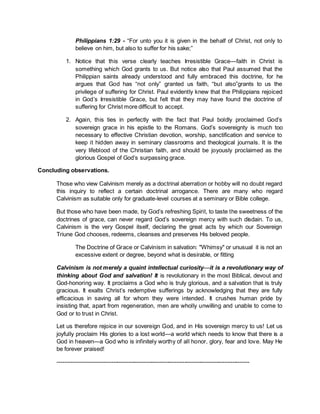
![http://evangelicalarminians.org/files/The%20Diversity%20of%20Arminian%20Soteriology
%20%28Pinson%29_1.pdf
THE DIVERSITY OF ARMINIAN SOTERIOLOGY:THOMAS GRANTHAM, JOHN
GOODWIN, AND JACOBUS ARMINIUS By J. Matthew Pinson 13 pages
http://www.etsjets.org/files/JETS-PDFs/47/47-1/47-1-pp121-136_JETS.pdf
JETS47/1 (March 2004) 121–36
IS THERE A REFORMED WAY TO GET THE BENEFITS OFTHE ATONEMENT TO
“THOSE WHO HAVE NEVER HEARD?” r. todd mangum 16 pages
http://www.theopedia.com/Salvation
Salvation:Salvation[1] refers to the act of God's grace in delivering his people
from bondage to sin and condemnation, transferring them to the kingdom of his
beloved Son (Col. 1:13), and giving them eternal life (Romans 6:23)—all on the
basis of what Christ accomplished in his atoning sacrifice. The Bible says we are
saved by grace through faith; and that not of ourselves, it is the gift of God
(Ephesians 2:8).
In theology, the study of salvation is called soteriology, from the Greek soteria
meaning "salvation". Salvation, virtually synonymous with the overall concept of
redemption, includes a past, present, and future sense. As Christians, we were
saved from the penalty of sin when God brought us to faith in Christ; we are
presently being saved from the power of sin as the Holy Spirit sanctifies us; and
we will someday be saved from the presence of sin when we meet Christ face to
face in glory. This idea is presented below in terms of initial, progressive, and
final salvation.
Calvinism, Classical Arminianism, Doctrine of Election, Hermeneutics, Molinism,
Philosophy: Theology's Handmaiden,Theologically Miscellaneous,What The Bible Says
-------------------------------------------------------------------------------------
It has been pictured in this way. Here is a vast host of people hurrying down the broad
road with their minds fixed upon their sins, and one stands calling attention to yonder door, the
entrance into the narrow way that leads to life eternal. On it is plainly depicted the text,
"Whosoever will, let him come." Every man is invited, no one need hesitate. Some may say, "Well, I
may not be of the elect, and so it would be useless for me to endeavor to come, for the door will not
open for me." But God's invitation is absolutely sincere; it is addressed to every man, "Whosoever
will, let him take of the water of life freely" (Rev. 22: 17). If men refuse to come, if they pursue their
own godless way down to the pit, whom can they blame but themselves for their eternal judgment?
The messenger addressed himself to all, the call came to all, the door could be entered by all, but
many refused to come and perished in their sins. Such men can never blame God for their eternal
destruction. The door was open, the invitation was given, they refused, and He says to them](https://image.slidesharecdn.com/evangelismsalvationcorrectlydone-150211080557-conversion-gate01/85/Evangelism-salvation-correctly-done-23-320.jpg)
![sorrowfully, "Ye will not come unto Me, that ye might have life." ... [But some will say], "I am
going inside: I will accept the invitation; I will enter that door," and he presses his way in and it
shuts behind him. As he turns about he finds written on the inside of the door the words, "Chosen
in Christ before the foundation ofthe world.
(H.A. Ironside)
Calvin's Commentaries Complete
http://www.biblestudyguide.org/comment/calvin/comm_index.htm
----------------------------------------------------------------------------------
Other voices.
J. I. Packer, Introductory Essay to Owen’s The Death of Death (London: Banner of Truth, 1983).
... Without realising it, we have during the past century bartered that gospel for a substitute
product which, though it looks similar enough in points of detail, is as a whole a decidedly
different thing. Hence our troubles; for the substitute product does not answer the ends for
which the authentic gospel has in past days proved itself so mighty. The new gospel
conspicuously fails to produce deep reverence, deep repentance, deep humility, a spirit of
worship, a concern for the church. Why? We would suggest that the reason lies in its own
character and content. It fails to make men God-centred in their thoughts and God-fearing in
their hearts because this is not primarily what it is trying to do. One way of stating the difference
between it and the old gospel is to say that it is too exclusively concerned to be “helpful” to
man—to bring peace, comfort, happiness, satisfaction—and too little concerned to glorify God.
The old gospel was “helpful,” too—more so, indeed, than is the new—but (so to speak)
incidentally, for its first concern was always to give glory to God. It was always and essentially a
proclamation of Divine sovereignty in mercy and judgment, a summons to bow down and
worship the mighty Lord on whom man depends for all good, both in nature and in grace. Its
centre of reference was unambiguously God. But in the new gospel the centre of reference is
man. This is just to say that the old gospel was religious in a way that the new gospel is not.
Whereas the chief aim of the old was to teach men to worship God, the concern of the new
seems limited to making them feel better. The subject of the old gospel was God and His ways
with men; the subject of the new is man and the help God gives him. There is a world of
difference. The whole perspective and emphasis of gospel preaching has changed.
C. H. Spurgeon, Election, (delivered September 2, 1855 at New Park Street Chapel).
It is no novelty, then, that I am preaching; no new doctrine. I love to proclaim these strong old
doctrines, which are called by nickname Calvinism, but which are surely and verily the revealed
truth of God as it is in Christ Jesus. By this truth I make a pilgrimage into the past, and as I go, I
see father after father, confessor after confessor, martyr after martyr, standing up to shake
hands with me. Were I a Pelagian, or a believer in the doctrine of free-will, I should have to walk
for centuries all alone. Here and there a heretic of no very honourable character might rise up
and call me brother. But taking these things to be the standard of my faith, I see the land of the](https://image.slidesharecdn.com/evangelismsalvationcorrectlydone-150211080557-conversion-gate01/85/Evangelism-salvation-correctly-done-24-320.jpg)
![ancients peopled with my brethren--I behold multitudes who confess the same as I do, and
acknowledge that this is the religion of God’s own church.
And, lest this should be too high for you, note the other mark of election, which is faith, “belief
of the truth.” Whoever believes God’s truth, and believes on Jesus Christ, is elect. I frequently
meet with poor souls, who are fretting and worrying themselves about this thought—”How, if I
should not be elect!” “Oh, sir,” they say, “I know I put my trust in Jesus; I know I believe in his
name and trust in his blood; but how if I should not be elect?” Poor dear creature! you do not
know much about the gospel, or you would never talk so, fo he that believes is elect. ...
A.W. Pink, Gleanings in the Godhead (Chicago: Moody Press, 1975), pp. 124-125.
There is a continual need to return to the great fundamental of the faith. As long as the age
lasts the Gospel of God’s grace must be preached. The need arises out of the natural state of
the human heart, which is essentially legalistic. The cardinal error against which the Gospel has
to contend is the inveterate tendency of men to rely on their own performances. The great
antagonist to the truth is the pride of man, which causes him to imagine that he can be, in part
at least, his own savior. This error is the prolific mother of a multitude of heresies. It is by this
falsehood that the pure stream of God’s truth, passing through human channels, has been
polluted.
Now the Gospel of God’s grace is epitomized in Ephesians 2:8-9, “For by grace are ye saved
through faith; and that not of yourselves: [it is] the gift of God: Not of works, lest any man should
boast.” All genuine reforms or revivals in the churches of God must have as their basis a plain
declaration of this doctrine. ...
After Luther came a still more distinguished teacher, John Calvin. He was much more deeply
taught in the truth of the Gospel, and pushed its central doctrine of grace to its logical
conclusions. As Charles Spurgeon said, “Luther had, as it were, undammed the stream of truth,
by breaking down the barriers which had kept back its living waters as in a great reservoir. But
the stream was turbid and carried down with it much which ought to have been left behind. Then
Calvin came, and cast salt into the waters, and purged them, so that there flowed on a purer
stream to gladden and refresh souls and quench the thirst of poor lost sinners.”
WHAT IS A BIBLICAL CHRISTIAN?
[What is a Biblical Christian?]
Albert N. Martin
There are many matters concerning which total ignorance and complete difference are neither
tragic nor fatal. I believe many of you are probably totally ignorant of Einstein’s theory of
relativity and if you were pressed to explain it to someone you would really be in difficulty. Not
only are you ignorant of Einstein’s theory of relativity, you are probably quite indifferent, and that
ignorance and indifference is neither fatal nor tragic.](https://image.slidesharecdn.com/evangelismsalvationcorrectlydone-150211080557-conversion-gate01/85/Evangelism-salvation-correctly-done-25-320.jpg)
![The theory of relativity, or simply relativity in physics, usually encompasses two
theories by Albert Einstein: special relativity and general relativity.[1] (The word
relativity can also be used in the context of an older theory, that of Galilean invariance.)
Concepts introduced by the theories of relativity include:
Measurements of various quantities are relative to the velocities of observers. In
particular, space contracts and time dilates.
Spacetime: space and time should be considered together and in relation to each
other.
The speed of light is nonetheless invariant, the same for all observers.
The term "theory of relativity" was based on the expression "relative theory" (German:
Relativtheorie) used in 1906 by Max Planck, who emphasized how the theory uses the
principle of relativity. In the discussion section of the same paper Alfred Bucherer used
for the first time the expression "theory of relativity" (German: Relativitätstheorie).[2][3]
The theory of relativity transformed theoretical physics and astronomy during the 20th
century. When first published, relativity superseded a 200-year-old theory of mechanics
created primarily by Isaac Newton.[4][5][6]
General relativity is a theory of gravitation developed by Einstein in the years
1907–1915. The development of general relativity began with the equivalence principle,
under which the states of accelerated motion and being at rest in a gravitational field (for
example when standing on the surface of the Earth) are physically identical. The upshot
of this is that free fall is inertial motion: an object in free fall is falling because that is how
objects move when there is no force being exerted on them, instead of this being due to
the force of gravity as is the case in classical mechanics. This is incompatible with
classical mechanics and special relativity because in those theories inertially moving
objects cannot accelerate with respect to each other, but objects in free fall do so. To
resolve this difficulty Einstein first proposed that spacetime is curved. In 1915, he
devised the Einstein field equations which relate the curvature of spacetime with the
mass, energy, and momentum within it.
In the field of physics, relativity improved the science of elementary particles and their
fundamental interactions, along with ushering in the nuclear age. With relativity,
cosmology and astrophysics predicted extraordinary astronomical phenomena such as
neutron stars, black holes, and gravitational waves.[4][5][6]
some of the consequences of general relativity are:
1. Clocks run slower in deeper gravitational wells.[8] This is called gravitational
time dilation.
2. Orbits precess in a way unexpected in Newton's theory of gravity. (This has
been observed in the orbit of Mercury and in binary pulsars).](https://image.slidesharecdn.com/evangelismsalvationcorrectlydone-150211080557-conversion-gate01/85/Evangelism-salvation-correctly-done-26-320.jpg)
![3. Rays of light bend in the presence of a gravitational field.
4. Rotating masses "drag along" the spacetime around them; a phenomenon
termed "frame-dragging".
5. so
Technically, general relativity is a theory of gravitation whose defining feature is its use
of the Einstein field equations. The solutions of the field equations are metric tensors
which define the topology of the spacetime and how objects move inertially.
http://en.wikipedia.org/wiki/Theory_of_relativity
I am sure there are few of us who can explain all the processes by which a brown cow
eats green grass and gives white milk. It does not keep you from enjoying the milk. But there
are some things concerning which ignorance and indifference are both tragic and fatal and one
such thing is the Bible’s answer to the question I am about to set before you.
‘What is a biblical Christian?’ In other words, when does a man or woman, a boy or girl, have
the right to take to himself or herself the name Christian, according to the Scriptures?
We do not want to make the assumption lightly that you are true Christians. I want to set before
you four strands of the Bible’s answer to that question.
1. ACCORDING TO THE BIBLE A CHRISTIAN IS A PERSON WHO HAS FACED
REALISTICALLY THE PROBLEM OF HIS OWN PERSONAL SIN
Now one of the many unique things about the Christian faith is this —unlike most of the
religions of the world, Christianity is essentially and fundamentally a sinner’s religion.
When the angel announced to Joseph he approaching birth of Jesus Christ, he did so in
these words, ‘Thou halt call his name Jesus, for he shall save his people from their sins’
[Matt 1.21]. The apostle Paul wrote in I Timothy 1.15, ‘This is a faithful saying and
worthy of all acceptance, that Christ Jesus came into the world to save sinners’. He
came into the world to save sinners. The Lord Jesus Christ himself says in Luke 5.31-
32, ‘Those that are healthy do not need a doctor but those who are sick. I did not come
to call the righteous, but sinners to repentance’. And the Christian is one who has faced
realistically this problem of his own personal sin.
When we turn to the Scripture and seek to take in the whole of its teaching on the
subject of sin, right down to its irreducible minimum, we find that the Scripture tells us
that each one of us has a two-fold personal problem in relation to sin. On the one hand,
we have the problem of a bad record and, on the other, the problem of a bad heart. If we
start in Genesis 3 and read that tragic account of man’s rebellion against God and his
fall into sin, then trace the biblical doctrine of sin all the way through the Old Testament,
and on into the New, right through to the Book of Revelation, we shall see that it is not
over-simplification to say that everything that the Bible teaches about the doctrine of](https://image.slidesharecdn.com/evangelismsalvationcorrectlydone-150211080557-conversion-gate01/85/Evangelism-salvation-correctly-done-27-320.jpg)
![sin can be reduced to those two fundamental categories — the problem of a bad record
and the problem of a bad heart.
What do I mean by ‘the problem of a bad record’? I am using that terminology to
describe what the Scripture sets before us as the doctrine of human guilt because of
sin. The Scripture tells us plainly that we obtained a bad record long before we had any
personal existence here upon the earth
‘Wherefore, as by one man sin entered into the world, and death by sin, and so
death passed upon all men, for that all have sinned’ [Rom 5.12]. When did the
‘all’ sin? We all sinned in Adam. He was appointed by God to represent all of the
human race and when he sinned we sinned in him and fell with him in his first
transgression.
That is why the apostle writes in 1 Corinthians 15.22, ‘As in Adam all die’. We
passed our age of accountability in the Garden of Eden and from the moment
Adam sinned we were charged with guilt. We fell in him in his first transgression
and we are part of the race that is under condemnation. Furthermore, the
Scripture says, after we come into being at our own conception and subsequent
birth additional guilt accrues to us for our own personal, individual
transgressions.
The Word of God teaches that there is not a just man upon the face of the earth
who does good and does not sin [Eccles 7.20], and every single sin incurs
additional guilt. Our record in heaven is a marred record. Almighty God measures
the totality of our human experience from the moment of our birth by a standard
which is absolutely inflexible; a standard that touches not only our external deeds
but also our thoughts and the very motions and intentions of our heart; so much
so, that the Lord Jesus said that the stirring of unjust anger is the very essence of
murder, the look with intention to lust as adultery. And God is keeping ‘a detailed
record’. That record is among ‘the books’ Which will be opened in the day of
judgment [Rev 20.12]. And there in those books is recorded every thought, every
motive, every intention, every deed, every dimension of human experience that is
contrary to the standard of God’s holy law, either failing to measure up to its
standard or transgressing it. We have the problem of a bad record — a record in
which we are charged with guilt; real guilt for real sin committed against the true
and the living God. That is why the Scripture tells us that the entire human race
stands guilty before Almighty God [Rom 3.19].
1. Has the problem of your own bad record ever become a burning, pressing
personal concern to you?
2. Have you faced the truth that Almighty God judged you guilty when our first
father sinned, and holds you guilty for every single word you have spoken
contrary to perfect holiness and justice and purity and righteousness?](https://image.slidesharecdn.com/evangelismsalvationcorrectlydone-150211080557-conversion-gate01/85/Evangelism-salvation-correctly-done-28-320.jpg)
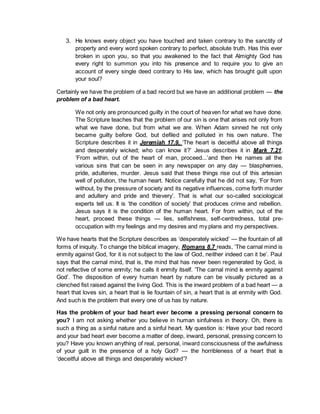
![A Bible Christian is a person who has in all seriousness taken to heart us own personal
problem of sin.
Now the degree to which we may feel the awful weight of sin differs from one person to
another. The length of time over which a person is brought to the consciousness of his
bad record and his bad heart differs. There are many variables, but Jesus Christ as the
Great Physician never brought his healing virtue to any who did not know themselves to
be sinners. He said, ‘I did not come to call the righteous, but sinners to repentance’
[Matt 9.13]. Are you a Bible Christian, one who has taken seriously your personal
problem of sin?
2. A BIBLE CHRISTIAN IS ONE WHO HAS SERIOUSLY CONSIDERED THE ONE DIVINE
REMEDYFOR SIN
In the Bible we are told again and again that Almighty God has taken the initiative in
doing something for man the sinner. The verses some of us learned in our infancy
underscore divine initiative in providing a remedy or sinful man: ‘God so loved the world
that he gave his only begotten Son . . .’; ‘Herein is love, not that we loved God, but that
he loved us and sent us Son to be the propitiation for our sins’; ‘But God, who is rich in
mercy, for his great love wherewith he loved us. . .’ [John 3.16; 1 John 10; Eph 2.41.
You see, the unique feature of the Christian faith is that it not a kind of religious
self-help where you patch yourself up with the aid of God. Just as surely as it is a
unique tenet of the Christian faith that Christ is a Saviour for sinners, so it is also a
unique tenet of the Christian faith that all of our true help comes down from above and
meets us where we are. We cannot pull ourselves up by our own boot-strings. God in
mercy breaks in upon the human situation and does something which we could never do
for ourselves. Now when we turn to the Scriptures we find that the divine remedy has at
least three simple but profoundly wonderful focal points:
(a) First of all, that divine remedy is bound up in a Person.
Anyone who begins to take seriously the divine remedy for human sin will notice
in the Scriptures that the remedy is not in a set of ideas, as though it were just
another philosophy, nor is it found in an institution, it is bound up in a Person.
‘God so loved the world that he gave his only begotten Son’. ‘Thou shalt call his
name Jesus for he shall save. . .’ He, himself, said, ‘I am the way, the truth and
the life; no man comes to the Father but by me’ [John 14.6]. That one divine
remedy is bound up in a Person and that Person is none other than our Lord
Jesus Christ — the eternal Word who became man, uniting to his Godhead a
true human nature. Here is God’s provision for man with his bad record and his
bad heart, a Saviour who is both God and man, the two natures joined in the one
Person for ever. And your personal problem of sin, and mine, if it is ever to be
remedied in a biblical way will be remedied only as we have personal dealings
with that Person. Such is the unique strand of the Christian faith — the sinner in
all his need united to the Saviour in all the plenitude of his grace, the sinner in his](https://image.slidesharecdn.com/evangelismsalvationcorrectlydone-150211080557-conversion-gate01/85/Evangelism-salvation-correctly-done-30-320.jpg)
![naked need and the Saviour in his almighty power, brought directly together in
the Gospel. That is the glory of the Gospel!
(b) It is centred in the cross upon which that Person died.
A cross that leads to an empty tomb, yes! And a cross preceded by a life of
perfect obedience, yes! And when we turn to the Scriptures we find that the
divine remedy in a unique way is centred in the cross of Jesus Christ. When he is
formally announced by John the Baptist, John points to him and says, ‘Behold
the Lamb of God who is bearing away the sin of the world’ [John 1.29]. Jesus
himself said, ‘I did not come to be ministered unto, but to minister and to give my
life a ransom for many’ [Matt 20.28], and true preaching of the Gospel is so
much centred in the cross that Paul says it is the word, or the message of the
cross. The preaching of the cross is ‘to them who are perishing foolishness, but
unto us who are being saved it is the power of God’ [1 Cor 1.18], and this same
apostle went on to say that when he came to Corinth — that bastion of
intellectualism and pagan Greek philosophy with its set patterns of rhetorical
expertise — ‘I came amongst you determined to know nothing save Jesus Christ
and him as crucified’ [1 Cor 2.2].
You see, God’s gracious remedy for sin is not only bound up in a Person, it
is centred in the cross of that Person — not
The cross as an abstract idea, nor as a religious symbol, but the cross in terms
of what God declares it to mean. The cross was the place where God heaped
upon his Son, by imputation, the sins of his people. On that cross there was
substitutionary curse-bearing. In the language of Galatians 3.13, ‘God made him
to be a curse for us’; ‘God made him to be sin for us’ [2 Cor 5.2] — the one who
knew no sin. It is not the cross as some nebulous, indefinable symbol of self-
giving love, it is the cross as the monumental display of how God can be just and
still pardon guilty sinners; the cross where God, having imputed the sins of his
people to Christ, pronounces judgment upon his Son as the representative of his
people. There on the cross God pours out the vials of his wrath, unmixed with
mercy, until his Son cries out, ‘My God, my God, why have you abandoned me?
why have you forsaken me?’ [Psa 22.1; Matt 27.46].](https://image.slidesharecdn.com/evangelismsalvationcorrectlydone-150211080557-conversion-gate01/85/Evangelism-salvation-correctly-done-31-320.jpg)
![There in the visible world at Calvary, God, as it were, was demonstrating
what was happening in the invisible spiritual world. He shrouds the heavens
in total darkness to let all mankind know that he is plunging his Son into the outer
darkness of the hell which your sins and my sins deserved. Jesus hangs on the
cross in the place of an undefended guilty criminal; he is in the posture of one for
whom society has but one option, ‘Away with him’, ‘Crucify him’, ‘Hand him over
to death’, and God does not intervene. There in the theatre of what men can see,
God is demonstrating what he is doing in the realm where we cannot see. He is
treating his Son as a criminal, he is causing him to feel in the depths of his own
soul all of the fury of the wrath that should have been vented upon us.
(c) A remedy that is adequate for and offered to all without discrimination.
Before we have any felt consciousness of our sin, about the easiest thing in the
world is to think that God can forgive sinners. But when you and I begin to have
any idea at all of what sin is — we, little worms of the dust, we creatures whose
very life and breath is held in the hands of the God in whom ‘we live and move
and have our being’ [Acts 17.28] — when we begin, I say, to take seriously that
we have dared to defy Almighty God who holds our breath in his hands, the God
who, when angels rebelled against him, did not wait to show mercy but
consigned them to everlasting chains of darkness with no way of mercy ever
planned or revealed to them, then our thoughts are changed.
Once we take seriously the truth that it is this holy God who sees the effusions of
the foul, corrupt human hearts which are yours and mine, then we say, ‘O God,
how can you be anything other than just; and if you give me what my sins
deserve, there is nothing for me but wrath and judgment! How can you forgive
me and still be just? How can you be a righteous God and do anything other than
consign me to everlasting punishment with those angels that rebelled’. When you
begin to take your sin seriously, forgiveness becomes the most knotty problem
with which your mind has ever wrestled. It is then that we need to know that God
has provided in a Person, and that Person crucified, a remedy that is adequate
for and offered to all without discrimination.
When God begins to make us feel the reality of our sin, if there were any
conditions placed on the availability of Christ we would say, ‘Surely I don’t meet
the conditions, surely I don’t qualify’, but the wonder of God’s provision is that it
comes in these unfettered terms: ‘Ho, everyone who thirsts, come to the waters;
he who has no money, come, buy wine and milk without money and without
price. Wherefore do you labour for that which does not satisfy’ [Isa 55.1 -2].
‘Come unto me, all ye that labour and are heavy laden, and I will give you rest.
Him that comes unto me I will in no wise cast out’ [Matt 11.28; John 6.37].
Oh, the beauty of the unfettered offers of mercy in Jesus Christ! We do not need to have
God step out of heaven and tell us that we, by name, are warranted to come; we have](https://image.slidesharecdn.com/evangelismsalvationcorrectlydone-150211080557-conversion-gate01/85/Evangelism-salvation-correctly-done-32-320.jpg)
![the unfettered offers of mercy in the words of his own Son, ‘Come unto me, all ye that
labour and are heavy laden, and I will give you rest’.
3. A BIBLE CHRISTIAN IS ONE WHO HAS WHOLEHEARTEDLY COMPLIED WITH THE
DIVINE TERMS FOR APPROPRIATING THE DIVINE PROVISION
The divine terms are two — repent and believe. That is what Jesus preached, ‘At that
time Jesus came preaching, Repent and believe the gospel’ [Mark 1.15, 16]. It is what
Paul preached. He says, ‘I testified to Jews and Greeks wherever I went, repentance
toward God, faith toward our Lord Jesus Christ’ [Acts 20.21]. This is the Gospel that
Jesus told his own to preach [Luke 24.45, 46].
He opened their minds to understand the Scripture and told them it was
necessary for Christ to die, and to be raised again from the dead the third day,
that repentance unto remission of sins should be preached in his name among all
the nations, beginning at Jerusalem.
What are the divine terms for obtaining the divine provision? We must repent, we
must believe. Now because we have to speak in terms of one word following another, or
preceding another, we must not think that this repentance is ever divorced from faith or
that this faith is ever divorced from repentance.
True faith is permeated with repentance, true repentance is permeated with
faith. They inter-penetrate one another so that, whenever there is a true
appropriation of the divine provision, there you will find a believing penitent and a
penitent believer. The one will never be divorced from the other.
What is repentance? The definition of the Shorter Catechism is an excellent
one:
‘Repentance unto life is a saving grace, whereby a sinner, out of a true
sense of his sin, and apprehension of (that is, a laying hold of) the mercy of
God in Christ, does with grief and hatred of his sin, turn from it unto God,
with full purpose of, and endeavour after, new obedience’.
Repentance is the prodigal down in the far country coming to his senses. He left
his father’s home because he could not stand his father’s government. Everything about
his father’s will and ways irritated him. It was a constant block to following the desires of
his own foul, wretched, sin-loving heart. The day came when he said he wanted what
was due to him. He went into the far country. When he left he had a notion of his father,
of his government and of his ways, which was entirely negative, but the Scripture tells us
in Luke 15 that down in the far country he came to himself: ‘And when he came to
himself he said, I will arise and go to my father and will say unto him, Father, I have
sinned against heaven, and before you, and am no more worthy to be called your son.
Make me as one of your hired servants’. And then the Scripture says he did not sit there
and think about it, and write poetry about it and send telegrams home to his Dad. It says,](https://image.slidesharecdn.com/evangelismsalvationcorrectlydone-150211080557-conversion-gate01/85/Evangelism-salvation-correctly-done-33-320.jpg)
![‘He rose up and came to his father’. He left all those companions who were his friends in
sin; he loathed and abominated and abhorred everything that belonged to that life-style.
He turned his back on it. And what was it that drew him home? It was the confidence
that there was a gracious father with a large heart and with the righteous rule for his
happy, loving home. And he said, ‘I will arise and go to my father’. He did not send a
telegram saying, ‘Dad, things are getting rough down here; my conscience is giving me
fits at night; won’t you send me some money to help me out and come and pay me a
visit and make me feel good?’ Not at all! He did not need just to feel good, he needed to
become good. And he left the far country. It is a beautiful stroke in our Lord’s picture
when he says, ‘While he was yet a great way off, his father saw him and had
compassion, and ran, and threw his arms around him and kissed him’. The prodigal did
not come strutting up to his father, talking about making a decision to come home. There
is a notion that people can come strutting into enquiry rooms and pray their little prayer
and so do God a favour by making their decision.
This has no more to do with conversion than my name is ‘Abraham Lincoln’. True
repentance involves recognizing that I have sinned against the God of heaven,
who is great and gracious, holy and loving, and that I am not worthy to be called
his son. And yet, when I am prepared to leave my sin, to turn my back upon it and to
come back haltingly, wondering if indeed there can be mercy for me, then — wonder of
wonders! — the Father meets me, and throws the arms of reconciling love and mercy
about me. I say it, not in a sentimental way but in all truth, he smothers repenting sinners
in forgiving and redemptive love.
But note, the father did not throw his arms around the Prodigal when he was still in the
hogpens and in the arms of harlots. Do I speak to some whose hearts are wedded to the
world, who love the world’s ways? Perhaps in your personal life, or in relationship to your
parents, or in your social life where you take so lightly the sanctity of the body, you show
what you are. Maybe some of you are involved in fornication, in heavy petting, involved
in looking at the kind of stuff on television and in the cinema that feeds your lust, and yet
you name the name of Christ. You live in the hog-pens and then go to a house of God
on Sunday. Shame on you! Leave your hog pens, your haunts of sin. Leave your
patterns and practices of fleshly and carnal indulgence. Repentance is being sorry
enough to quit your sin. You will never know the forgiving mercy of God while you are
still wedded to your sins.
Repentance is the soul’s divorce from sin but it will always be joined to faith.
What is faith? Faith is the casting of the soul upon Christ as he is offered to us in the
Gospel.
Forsaking All I Take Him. That is faith! ‘As many as received him, to them gave he the
right to become the sons of God, even to them that believe in his name’ [John 1.12].
Faith is likened to drinking of Christ. In my soul-thirst I drink of him. Faith is likened to
looking to Christ. Faith is likened to following Christ, fleeing to Christ. The Bible uses](https://image.slidesharecdn.com/evangelismsalvationcorrectlydone-150211080557-conversion-gate01/85/Evangelism-salvation-correctly-done-34-320.jpg)
![many analogies and the sum of all of them is this, that in the nakedness of my need I
cast myself upon the Saviour, trusting him to be to me all that he has promised to be to
needy sinners.
Faith brings nothing to Christ but an empty hand by which it takes Christ and all
that is in him. And what is in him? Full pardon for all my sins! His perfect obedience is
put to my account. His death is counted as mine. And the gift of the Spirit is in him.
Adoption, sanctification and ultimately glorification are all in him, and faith, in taking
Christ, receives all that is in him. ‘But of him are ye in Christ Jesus, whom God has
made unto us wisdom, and righteousness, and sanctification and redemption’ [1 Cor
1.30].
What is a biblical Christian?
A biblical Christian is a person who has wholeheartedly complied with the divine
terms for obtaining the divine provision for sin. Those terms are repentance and
faith. I like to think of them as the hinge on which the door of salvation turns. The
hinge has two plates. One that is screwed to the door and the other screwed to the
door jam. They are held together by a pin and on that hinge the door turns. Christ
is that door, but none enter through him who do not repent and believe, and there
is no true hinge made up only of repentance. A repentance that is not joined to
faith is a legal repentance. It terminates on yourself and on your sin.
A professed faith that is not joined to repentance is a spurious faith, for faith Is faith in
Christ to save me, not in but from my sin. Repentance and faith are inseparable and
except you repent you will perish. He that believeth not shall be damned.
4. A TRUE CHRISTIAN IS A PERSON WHO MANIFESTS IN HIS LIFE THAT HIS CLAIMS TO
REPENTANCE AND FAITH ARE REAL
Paul said that he preached that men should repent and turn to God and do works meet
for, answering to, consistent with, repentance [Acts 26.20]. ‘By grace are you saved
through faith, and that not of yourselves, it is the gift of God, not of works, lest any man
should boast. For we are his workmanship, created in Christ Jesus unto good works
which God before ordained that we should walk in them’ [Eph 2.8-101. Paul says in
Galatians chapter 5, that faith works by love.
Wherever there is true faith in Christ there will always be implanted genuine love
to Christ and where there is love to Christ there will be obedience to Christ.
True faith always works by love, and what does it work? A life of obedience! ‘He
that has my commandments, and keeps them, he it is that loves me. He that loves me
not, keeps not my sayings’ [John 14.21-24].
We are not saved by loving Christ, we are saved by trusting Christ, but a trust that
produces no love is not real. True faith works by love, and that which love works is not](https://image.slidesharecdn.com/evangelismsalvationcorrectlydone-150211080557-conversion-gate01/85/Evangelism-salvation-correctly-done-35-320.jpg)
![the ability to sit out on a beautiful starlight night writing poetry about how exciting it is to
be a Christian.
It works by causing you to go back into that home and to obey your father and your
mother as the Bible tells you to do, or back to that university campus to take a stand for
truth and righteousness against all the pressure of your peers.
True faith makes you willing and prepared to be counted a fool and crazy, willing to be
considered anachronistic, because you believe that there are eternal, unchangeable,
moral and ethical standards. You are willing to believe in the sanctity of human life, and
to take your stand against pre-marital sex and the murdering of babies in mothers’
wombs. For Jesus said, ‘Whoever shall be ashamed of me and of my words in this
adulterous and sinful generation, of him shall the Son of man be ashamed, when he
comes in the glory of his Father with the holy angels’ [Mark 8.38]. What is a Bible
Christian? Not merely one who says, ‘Oh, yes, I know I am a sinner, with a bad record
and a bad heart. I know that God’s provision for sinners is in Christ and in his cross,
adequate, freely offered to all, and I know it comes to all who repent and believe’. That is
not enough. Do you profess to repent and believe? Then can you make that profession
stick, not by a life of perfection but by a life of purposeful obedience to Jesus Christ?
‘Not everyone who says unto me, Lord, Lord, shall enter the kingdom of heaven’, Jesus
said, ‘but he who is doing the will of my Father who is in heaven’ [Matt 7.21]. In
Hebrews 5.8 we read, ‘He became the author of eternal salvation to all who obey him’ I
John 2.4, ‘He that says, I know him, and keeps not his commandments is a liar and the
truth is not in him.’
Can you make your claim to be a Christian stick from the Bible? Does your life manifest
the fruits of repentance and faith? Do you possess a life of attachment to Christ, of
obedience to Christ and confession of Christ? Is your behaviour marked by adherence to
the ways of Christ? Not perfectly — No! every day you must pray, ‘Forgive us our sins as
we forgive those who trespass against us’. But you can also say, ‘For me to live is
Christ’, or Jesus I my cross have taken All to leave and follow thee.
The world behind me, the cross before me, I have decided to follow Jesus. That is what
a true Christian is. How many of us are real Christians? I leave you to answer in the
deep chambers of your own mind and heart. But, remember, answer with an answer that
you will be prepared to live with for eternity. Be content with no answer but that which
will find you comfortable in death and safe in the day of judgment.
Author
Al Martin is pastor of Trinity Baptist Church, 116 Horseneck Road, Montv ille, New Jersey 07045, U.S.A., and an Associate Edit or of the Banner of Truth
magazine. This address was giv en at the Banner of Truth Youth Conf erencee
EVANGELISTIC MALPRACTICE
William MacDonald](https://image.slidesharecdn.com/evangelismsalvationcorrectlydone-150211080557-conversion-gate01/85/Evangelism-salvation-correctly-done-36-320.jpg)
![There is a curious problem today in the evangelical [and fundamental] world — one that poses
sobering questions for the church and for the individual believer. The problem in brief is this: a
great army of personal soul-winners has been mobilized to reach the populace for Christ. They
are earnest, zealous, enthusiastic, and persuasive. To their credit it must be said that they are
on the job. And it is one of the phenomena of our times that they rack up an astounding number
of conversions. Everything so far seems to be on the plus side.
But the problem is this: The conversions do not stick. The fruit does not remain. Six months later
there is nothing to be seen for all the aggressive evangelism. The capsule technique of soul
winning has produced stillbirths.
What lies at the back of all this malpractice in bringing souls to the birth? Strangely enough it
begins with the valid determination to preach the pure gospel of the grace of God. We want to
keep the message simple — uncluttered by any suggestion that man can ever earn or deserve
eternal life. Justification is by faith alone, apart from the deeds of the law. Therefore, the
message is “only believe.”
From there the message is reduced to a concise formula. For instance, the evangelistic process
is cut down to a few basic questions and answers, as follows:
“Do you believe you are a sinner?” “Yes.”
“Do you believe Christ died for sinners?” “Yes.”
“Will you receive Him as your Savior?” “Yes.”
“Then you are saved!” “I am?” “Yes, the Bible says you are saved.”
At first blush the method and the message might seem above criticism. But on closer study we
are forced to have second thoughts and to conclude that the gospel has been over-simplified.
The first fatal flaw is the missing emphasis on repentance.
There can be no true conversion without conviction of sin. It is one thing to agree that I
am a sinner: it is quite another thing to experience the convicting ministry of the Holy
Spirit in my life. Unless I have a Spirit-wrought consciousness of my utterly lost
condition, I can never exercise saving faith. It is useless to tell unconvicted sinners to
believe on Jesus — that message is only for those who know they are lost. We sugar-
coat the gospel when we de-emphasize man’s fallen condition. With that kind of
watered-down message, people receive the Word with joy instead of with deep
contrition. They do not have deep roots, and though they might endure for a while, they
soon give up all profession when persecution or trouble comes (Matt. 13:21). Many have
forgotten that the message is repentance toward God as well as faith in our Lord Jesus
Christ.
A second serious omission is a missing emphasis on the Lordship of Christ.](https://image.slidesharecdn.com/evangelismsalvationcorrectlydone-150211080557-conversion-gate01/85/Evangelism-salvation-correctly-done-37-320.jpg)
